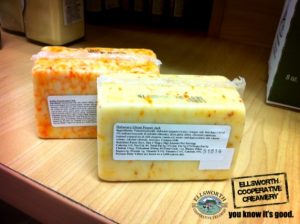Cheese: Delicious & Nutritious
April 17, 2017 Cheese is a concentrated source of the nutrients found in milk. It is an excellent source of dietary calcium for adults, a key nutrient for building strong bones and teeth and preventing osteoporosis.
Cheese is a concentrated source of the nutrients found in milk. It is an excellent source of dietary calcium for adults, a key nutrient for building strong bones and teeth and preventing osteoporosis.
Review the Research
Recent and emerging research has shown that cheese may hold potent anti-cancer properties. The milkfat in cheese is one of the richest, natural dietary sources of conjugated linoleic acid or CLA, a form of the essential fatty acid linoleic acid. Biomedical and carcinogenic animal model studies have shown that dietary CLA inhibits a variety of cancers. Based on these studies, a National Academy of Sciences report states that “CLA is the only fatty acid shown unequivocally to inhibit carcinogenisis in experimental animals.” There is evidence that CLA may provide cardiovascular health benefits as well.
And, did you know that cheese can also support dental health? The American Academy of Pediatric Dentistry and the American Dental Association recognize that consuming certain cheeses immediately after meals or as a between meal snack can help prevent tooth decay.
Cheese, including Cheddar, Swiss, Blue, Monterey Jack, Brie and Gouda have been shown to stimulate saliva flow and inhibit plaque bacteria. The calcium and phosphorus in cheese also help to maintain healthy tooth enamel.
Cheese Contains Important Essential Nutrients
Cheese contributes only 5% of the calories in the U.S. diet and provides important essential nutrients for good health including calcium, phosphorus, high quality protein, vitamin A, riboflavin, Vitamin B12 and zinc. Most varieties of cheese are an excellent source of calcium, conveniently providing calcium for adults who may not meet daily recommendations and risk poor bone health. As a great alternate source of protein, cheese can fill the protein gap, especially for those reducing or not eating meat.
What about sodium in cheese?
Salt is an essential part of the cheesemaking process. Salt acts as a natural preservative and helps to control moisture. Most of the sodium in the U.S. diet comes from sources other than cheese. Salt cannot be eliminated, but some cheeses require more salt than others. If trying to lower the sodium in your diet, choose softer, less aged cheeses like Swiss, Monterey Jack, or Ricotta. Lower sodium varieties of Colby-Jack, Provolone, Cheddar, Mozzarella and Muenster are also available.
What if I am lactose intolerant?
During the cheesemaking process, most of the lactose is removed when the curds are separated from the whey — making this dairy food a nutritious choice for those who cannot tolerate lactose. Cheese can be an important source of calcium for those with lactose intolerance, a fact that is supported by the Institute of Medicine, The National Medical Association and the American Academy of Pediatrics. Popular natural cheeses with minimal amounts of lactose include Cheddar, Colby, Swiss, Monterey Jack and Mozzarella.
Information made available by the Wisconsin Milk Marketing Board
Connect with us
Sign up for our newsletter
Customer Service
Latest News
 The Ultimate Cheese Challenge Returns: Which Cheese Will Reign Supreme?March 8, 2025 - 11:59 am
The Ultimate Cheese Challenge Returns: Which Cheese Will Reign Supreme?March 8, 2025 - 11:59 am A Fresh Look for a Timeless Tradition: Our New Brand EvolutionJanuary 20, 2025 - 11:39 am
A Fresh Look for a Timeless Tradition: Our New Brand EvolutionJanuary 20, 2025 - 11:39 am 2024 Holiday Gift CatalogOctober 1, 2024 - 4:16 pm
2024 Holiday Gift CatalogOctober 1, 2024 - 4:16 pm

